
Climate change has become one of the biggest issues for asset owners and managers as they move to tackle global warming. Room151 convened a roundtable of LGPS practitioners and advisers to discuss how approaches to the challenge are evolving. Sponsored by Columbia Threadneedle.

Panellists
Moira Gorman (chair): client relationship & sales director, Columbia Threadneedle
Abigail Leech: head of fund, Lancashire County Pension Fund
Jo Ray: head of pensions, Lincolnshire County Council
Rachel Elwell: chief executive, Border to Coast Pensions Partnership.
Ingrid Edmund: senior portfolio manager, infrastructure investments, Columbia Threaneedle.
Bola Tobun: finance manager (pensions & treasury), London Borough of Enfield.
Bridget Uku: group manager treasury & investments, London Borough of Ealing.
Thora Frost: senior manager, green finance, The Carbon Trust.
Gillian de Candole: investment principle, private markets, Brunel pension Partnership.
Aoifinn Devitt: independent investment adviser.
Moira Gorman (chair): Abigail, what kind of questions are you facing at Lancashire regarding climate change?
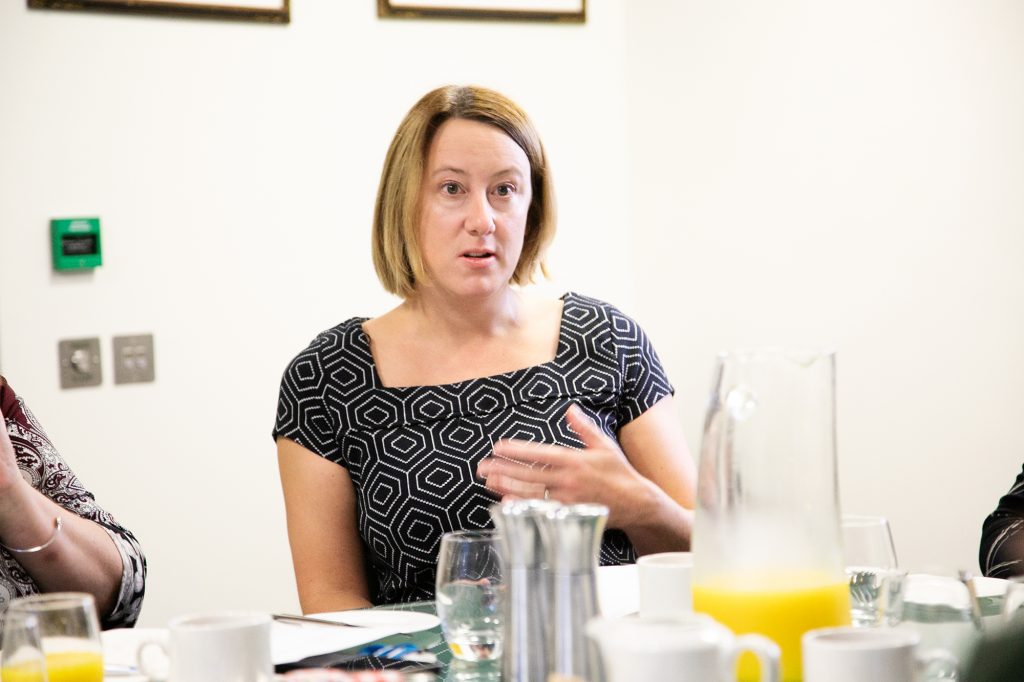
Abigail Leech: People are asking: What’s the impact on the fund? What you are doing, or not doing, and how is that effecting investments?
We have quite a lot of green assets, a lot of wind farms and solar. But I think for Green Party members, that’s not enough really.
We’ve had attention from the local press, we’ve had climate change protesters. It’s unquestionably an area that is going to increase pressure on us.
Labour Party members have started to focus on this area too, so I think we will start to see more pressure at the fund level.
I think even the employers within the fund will start to ask: what is the fund doing about responsible investment?

Chair: Jo, you’re in the process of transitioning various assets to the Border to Coast pool. Does climate change affect that process?
Jo Ray: What we have done recently with the pensions committee is agree a set of responsible investment (RI) beliefs, to set alongside our core investment beliefs.
For example, do we believe in divestment or not? What do we think about climate change, about how we should invest to make sure we are benefitting from the move to a low-carbon economy?
We’ve also been doing a lot of training with the committee, so they can understand more on wider responsible investment, not just climate change.
REGISTER for Room151’s free LGPS Quarterly Briefing
Obviously, it’s high-profile so we have to be specific about our view on climate change and what we are looking to do; but we do see it as part of the overall long-term sustainable investment strategy.
One of the biggest questions for us, at the moment, is what we do with our passive investments? Because there are some indices out there with fewer options on solely UK passive investments. So, we need to ask what is going to give us a similar return profile to what we are looking for, while also reducing our exposure to carbon-producing assets.
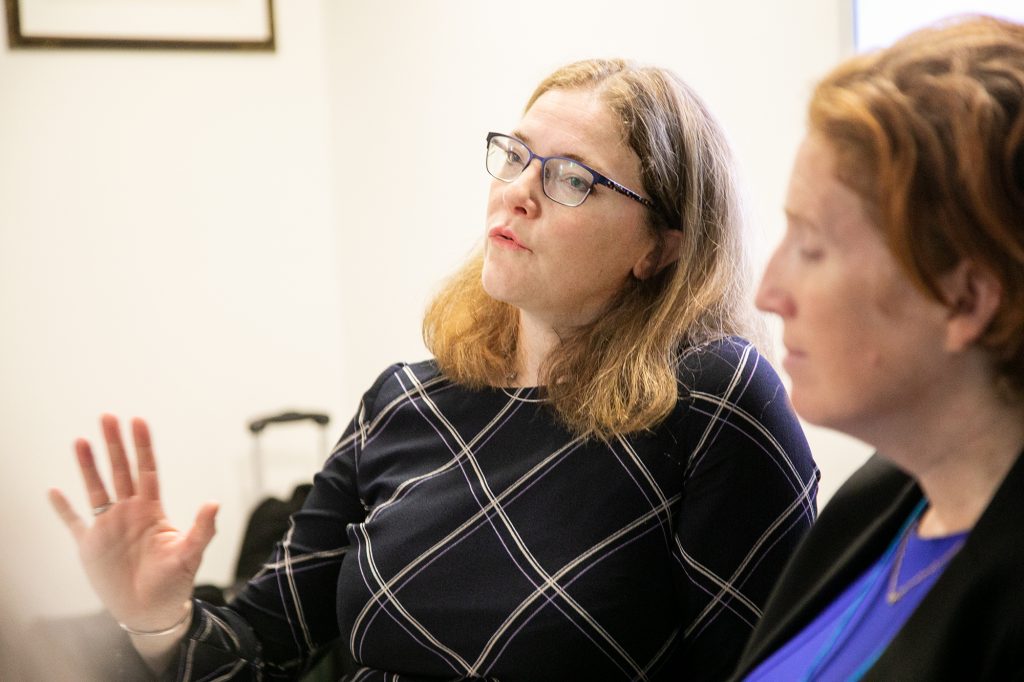
Chair: Rachel where are you with Border to Coast?
Rachel Elwell: It’s a massive issue, and I think about two thirds of our partner funds have declared climate emergencies and some others are going through the process.
We set up a working party and received huge amounts of support from the asset management industry and asset owner industry. We did six sessions and heard from people like Jaap van Dam of PGGM; they’ve done a lot of work looking at how asset owners can think about climate change.
We also heard from some other players across the industry, latterly, Adam Matthews, from the Church of England, who did a fantastic session with us on what it means to work in collaboration with other asset owners.
Following on from that, we are just about to go through the round of governance with our pensions committee to achieve sign-off on our responsible investment policy, which includes our response to climate change.
Investor pressure is a key driver of action, as we see in the public markets, and unless the LPs ask the right questions, it’s not going to happen.
Ingrid Edmund, Columbia Threadneedle
Chair: Ingrid, as an asset manager, how is climate change impacting your approach to managing infrastructure and what you might expect to happen going forward?
Ingrid Edmund: The pressure originally came through regulation, policy and politics, rather than investment considerations. Infrastructure, given its nature, has automatically been seen as a more sustainable asset class, where it’s easier to tick ESG boxes.
In the last few years we’ve seen a real move from just ticking boxes. More limited partners (LPs) are asking detailed questions specifically about climate issues, which is inevitably driving the managers’ own ESG activities. The continuous dialogue with LPs is a really important component of what we do. Investor pressure is a key driver of action, as we see in the public markets, and unless the LPs ask the right questions, it’s not going to happen.
For us, as long-term buyers of core infrastructure assets, it raises the question of real integration of sustainability into the investment process on an ongoing basis. It’s made us think a lot more about resilience and transition risk, the risk of holding a stranded asset in 20 years.
We look at sustainability from two angles. One is the impact of our investments on the environment, socially and so on. The other one, is what is assessing the climate risk to our investments that could impact the long-term financial returns and how do we protect them. They are more and more interlinked.
Emergency
Chair: Bola, Enfield is one of the London boroughs that declared a climate emergency. How does that affect your investments for a pension fund?
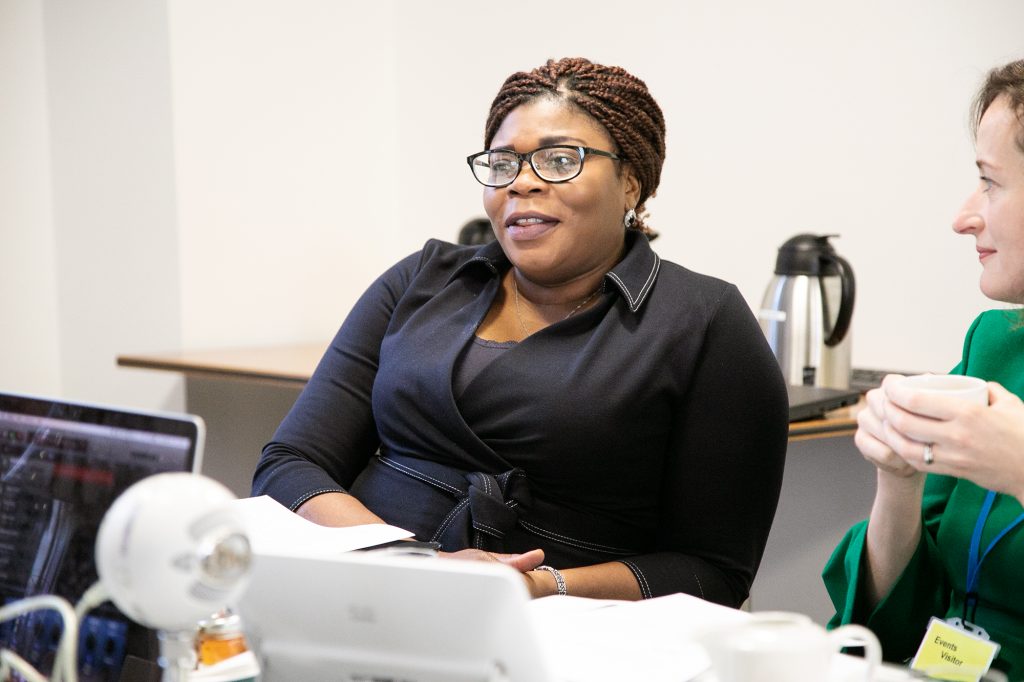
Bola Tobun: Two weeks into my current role with Enfield, the council declared a climate emergency and the pensions committee had a meeting to see what can be done with regards to the pension fund investments. It was decided, further training and education for the committee as a whole in this area and other ESG issues would be useful.
So, we invited four different fund managers to present to us on different aspects of investments: low carbon, impact investing, renewable energy and clean energy.
The pension board and committee members were actually happy for this exposure as the training enabled them to see what products are available and that fund managers are happy to work with them to provide a suitable product, at a price.
For example, we talked about excluding certain stocks from an investment portfolio. And from this conversation and discussion, it was noted that it would be rather expensive as it would be difficult to manage such a mandate as part of a pooled investment fund.
It was also noted that for a fund to incur a reasonable fee for an exclusion mandate, collaboration with three or more other likeminded boroughs with this same appetite would be needed.
I trust this training is preparing the committee for the task ahead, that’s to articulate the fund’s investment beliefs.
We are now preparing for the first two workshops agreed by the committee to start formulating the Enfield Pension Fund investment beliefs, not just on climate change issues, but other ESG issues in order to integrate the agreed beliefs into the fund’s investment strategy.
Chair: Bridget, on declaring a climate emergency, do you face some of the same issues as Bola?
Bridget Uku: We have a very long-term investment horizon. We have an open scheme, so lots of young people coming in. It’s important we take into consideration what is going to happen to the world in the future, otherwise there will be no pensions.
We are still following the engagement route through the LAPFF. And we have segregated mandates, making sure they take on any voting directives that we provide.
When we go to tender, we are very much hard coding ESG, and making sure managers are implementing this into their investment strategy. Even when we went into private markets, we were hard coding ESG criteria.
We haven’t opted to measure our carbon footprint, because we find that it’s quite unreliable.
We are moving into passive and we’re concerned about not being able to vote. So, what we’ve done is introduce a tilt, with a low-carbon investment, and actually we are the first local authority to invest in the FTSE Future World Fund, which is looking at companies that are going to be more sustainable.
We realise also that a lot of the fossil fuel companies are invested in renewables, so you can’t completely disregard them, because they might be the ones who shine in the future.
We’ve still got some dry powder, as far as infrastructure is concerned, and we are happy that London CIV has introduced renewable energy and clean tech into their infrastructure. We are going to be looking into that and impact investing too.
Chair: Thora, how do both asset managers and asset owners change or amend their investment strategy to account for climate change?

Thora Frost: The [market] leaders are signing up for the UN Principles for Responsible Investment (PRI), and looking to follow its recommendations.
They are starting to look at the journey on reporting in line with the recommendations from the Task Force on Climate-related Financial Disclosures (TCFD), though I don’t think anyone is really fully complying with all of those yet.
The leaders are definitely looking to commit to science-based targets, some of them are very testing though. They are incorporating the risks of climate change in their mandate, in their strategy, really integrating the whole process.
I guess part of TCFD is having it in risk management, and also the setting of metrics and targets, to be transparent and to show accountability. It’s about moving from the negative screening and the knee-jerk potential reaction to engagement and looking at the transition. For example, who are the climate leaders of the future, and how can we look at that in investment strategy?
Which is not an easy task, looking at transition, physical risk, and incorporating that into your strategy. It’s interesting, in the Japanese [government] pension fund, one of the biggest in the world, the CEO says: it’s not disinvestment it’s engagement, it’s having a long-term relationship with your asset managers and ensuring that they are active.
Impact
Chair: What asset classes can make the most impact on improving climate change?
Bridget Uku: It has to be equities; equities are definitely the easiest way to have an impact. As a shareholder, you can vote, you can walk.
It’s probably a bit harder in the private markets but I think, as investors, the more we demand it from our service providers, the more innovative they become and actually take the climate risk or opportunities seriously. I think we as investors have to drive that change.
Mandates
Chair: Does it mean changing the investment mandates of your managers?
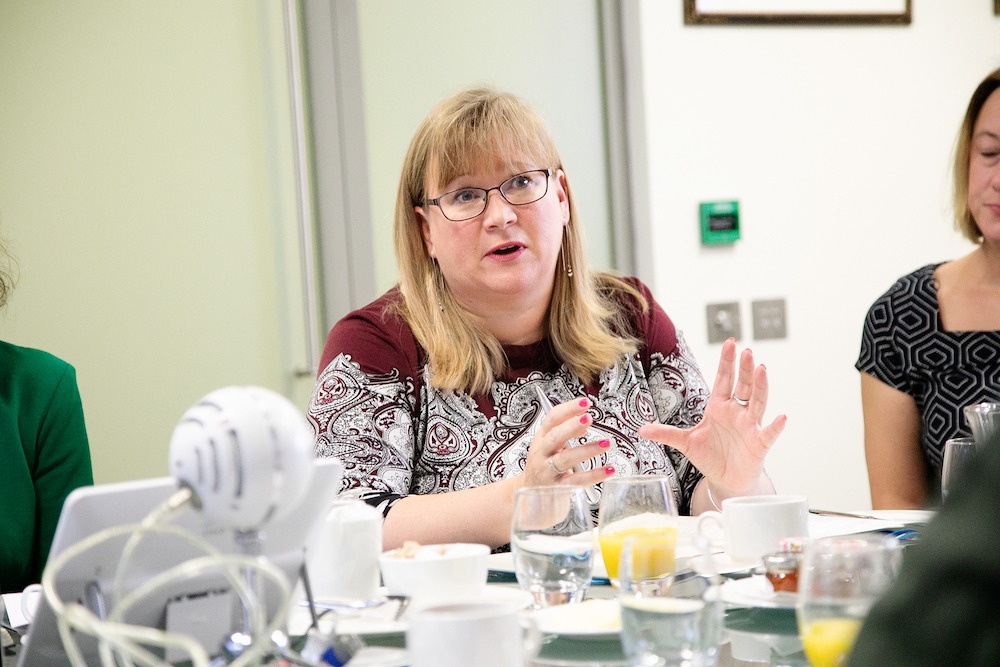
Jo Ray: It’s very much a shift from managers having paid lip service to it saying, ‘Yes, we look at ESG, we have got a little group that sits in the corner’, to now making sure that it is fully integrated across the whole investment process, it’s not just an add-on.
They are looking at the financial risks, ESG risks, they are looking at everything together before they make any investment decision. There has been a huge shift, and managers have understood now that we are not just going to say, ‘Oh, they said they do ESG, that’s fine.’
Gillian de Candole: That is key. You can ask for and receive evidence. I take the point on carbon foot printing, and there being different metrics and measurements but, if you opt for one, then at least the results are consistent.
You can also measure trends over time. It’s incredibly useful when you are looking at managers, and they say they are doing great things. They might score very well on some metrics, and then you look at their carbon footprint and you are like: “Tell me why? Where is this coming from?” Then you can break it down into individual stocks and dig deeper.

Ingrid Edmund: I think to your point, it’s also, how do managers translate that into their invested companies?
From my perspective on the infrastructure side, I see a lot of limited partners (LPs) saying they want to invest in renewable energy and clean energy only to meet their green agenda. And that’s almost a form of exclusion to the rest of infrastructure because … energy is one area where significant change is already happening and investor interest has had a great impact. We also see more focus on smart grids and energy storage.
However, if you don’t also look to engage in decarbonising transportation and buildings, which are the biggest carbon producers after energy production, then you can produce all the green energy you like but you are still going to consume a huge amount of energy from fossil fuel.
Rachel Elwell: Building on that, probably because we have had such low interest rates for such a long time, the vast majority of capital that companies are raising is not coming from public equity markets.
So, we’re working out how we make a difference in other financial markets, influencing banks, insurers, as asset owners, influencing through being bond holders.
I have seen investment teams and CIOs resign because one thing that is very common is, no investors like to be told to divest. It’s like a red rag to a bull.
Aoifinn Devitt
Divestment
Chair: Aoiffin, in terms of equity, fixed income and real assets, how does it affect how you are advising your clients in terms of how they can be approaching it?
Aoifinn Devitt: From my perspective, I ask who should the pressure come from? Does it come from the fund, does it come from the pool? Often the underlying demands are coming from the constituent members, and flowing to the panel members.
They have to have a policy but equally they will go back to the pool and say, what’s your engagement policy, or, tell us what our responsible investment looks like across the portfolio.
I’m a little bit wary of the narratives that take hold. And I think one of the narratives that is taking hold right now is that “engagement” is better than “divestment”, and I think that sometimes we need to question that.
Look at the US, the New York State Common Retirement Fund, and what’s happening there. There has recently been an eighteen-month study by a group of experts [a decarbonsation advisory panel] there asking whether they should divest from all fossil fuels as a part of the climate emergency, and they resoundingly agree that, yes, they should.
And now they are putting in a very ambitious plan to basically have a full divestment policy because of the climate emergency. And that is quite controversial. I have seen investment teams and CIOs resign because one thing that is very common is, no investors like to be told to divest. It’s like a red rag to a bull.
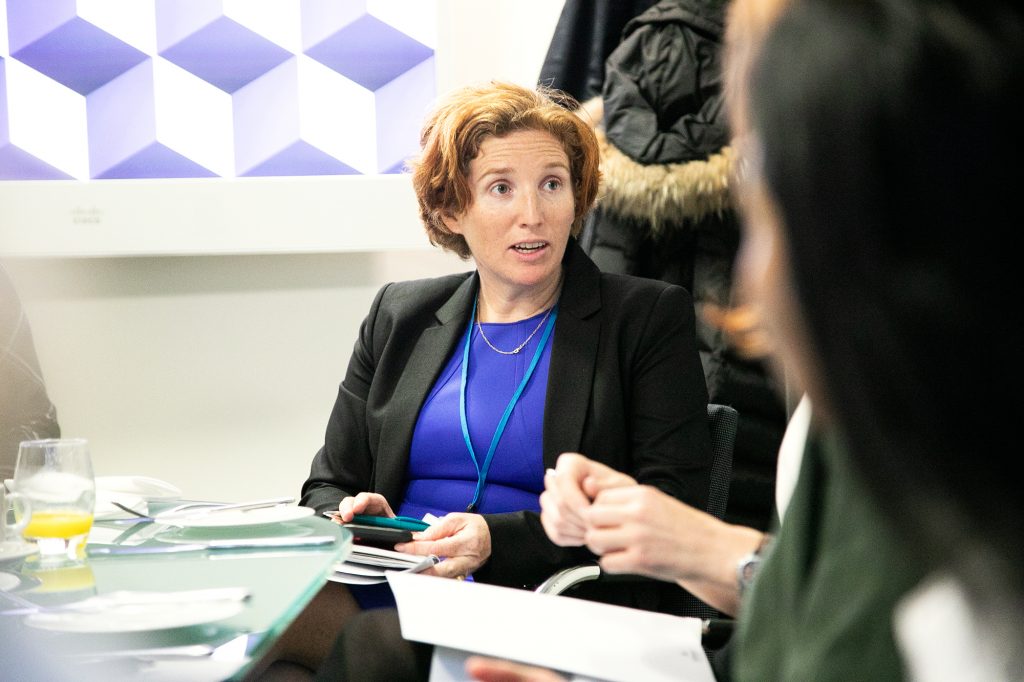
Often the pushback to the divestment agenda is: “Oh, how do you define what we need to divest from? If you divest from landmines, do we have to divest from all gun manufacturers? If it’s tobacco, how about alcohol, how about casinos?” It’s like, “Well, do we open the floodgates then?”
To be honest I’m a little bit tired of those types of excuses, because someone has to draw a line somewhere. And, yes, it will be imperfect, there will always be grey areas.
Managers don’t always like to change the status quo, and that’s a message I’m getting. But if we look at the asset management industry today it is being vigorously disrupted. In some areas it is contracting not growing.
In order to change, there will have to be massive innovation, probably headcount cuts, or at least shifts. Naturally, there may be resistance to change, and that’s where we are getting “divestment is not the answer, it’s engagement”.
The point is, engagement is not always working. We may get asked to show evidence that it is working but that is not easy. They [asset managers] may say, “But we voted, but the vote was defeated.”
Behaviourally, at what point do you say this engagement is not working, now we are going to divest?
Rachel Elwell: There’s a big difference, though, between excluding sectors and using divestment as part of your engagement strategy to hold companies—who are not behaving how they should—to account.
I really struggle with sector divestment, but I don’t at all struggle with saying we are going to zero-weight a particular company because we do not think they are a good investment. We should be here to make the right long-term investment decisions for the pension funds, who we are here to serve.
Allocation
Moira: Can I ask, maybe, Thora, do you have a scientifically based view on where asset owners can invest to make the biggest positive impact on climate change?
Thora Frost: One way to start is looking at where the most emissions are. The government has just come out with a response to the independent Committee on Climate Change which gives an indication of where the regulations are going to go.
The biggest emitters are energy production, transport, buildings. It’s going to have to mean a huge overhaul of all that capital structure. And that is going to have to start happening now.
Moira: Climate change has really moved up the agenda for asset owners and asset managers. Is this really going to be at the top of your agenda as you go forward into the next rounds of asset allocation and manager selection?
Jo Ray: There are not many pensions committees now where [climate change] is not mentioned. We report on what we do with responsible investment in our quarterly papers. It’s not going away.
The real benefit, bringing pooling into it, is now actually we have an additional resource to use for a fund that is small-ish. We don’t have huge resources, or the time to look at these things, if you want to do it properly. It’s incredibly resource-intensive.
And as a stand-alone fund we couldn’t do that without employing more people. So, the benefit of pooling is we now have this additional resource to work with us to make a greater impact.
I have seen investment teams and CIOs resign because one thing that is very common is, no investors like to be told to divest. It’s like a red rag to a bull.
Gillian de Candole, Brunel Pension Partnerships
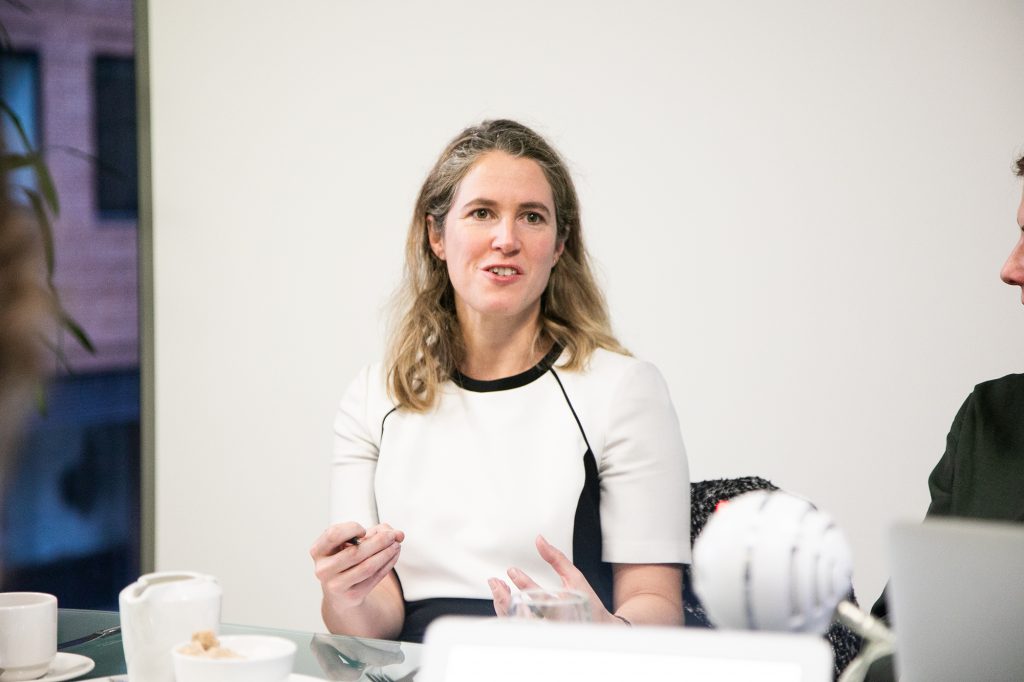
Gillian de Candole: I want to pick up on something I think Bola said: If you do choose to go through a selective divestment route, how do you operationalise that if you are small? It’s interesting to hear that if those are the sorts of questions being asked, you need to ask your pool, can you give me solutions to operationalise this strategy?
Ingrid Edmund: For me it’s also the education around it as well. You are going to engage, but what does that mean? How do you engage in the right way? What are the right questions to ask?
There is still a bit of a disconnect between getting the various stakeholders to understand exactly what they are looking for, and then evaluate whether they are getting the right answers. It’s really important to get that understanding of what is out there, what the options are, how can you manage these risks, what are your managers doing?
LGPS women discuss: Collaboration, advisers and responsible investing










